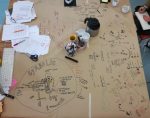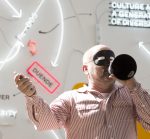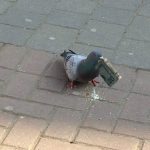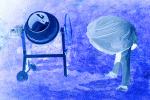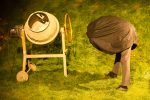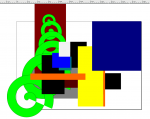Adriana La Selva is participant of the a.pass PhD research program and proposes the 2 day seminar "What are you training for?" in relation to her home university U-Ghent. The topic addresses the conditions of the body in relation to its performativity. Starting the investigations of the self-creation of conditions at the body seems to comply with the intentions of the block MAKING / CONDITIONS perfectly. We therefore decided to join this seminar as part of Plenum I. The first round of the individual research presentations of each a.pass participant will take place within this seminar and amongst the seminar participants.
outline
This inter-university specialist course intends to investigate acting and performing techniques as a field of knowledge separated from those of the representation and spectacle.
In which ways can performer’s technique (a range of codified skills one chooses to learn) and performer’s training processes (how you engage with techniques towards creation or, how you create a certain routine to deal/improve these techniques), dialogue with other fields of study, such as philosophy, sociology and politics? Can we look at technique as an aesthetic/poetic device on its own? What is performative about it?
The designed programme seeks to investigate and challenge what acting and performance technique is, and how it is disseminated through artistic, social and political agency.
We will tackle this frame in both theory and practice, with interactive workshops, work demonstrations, reading seminars and lectures, where acting and performance technique apprenticeship will dialogue with a philosophical context which unfolds the notion of epistemology: the study of the nature of knowledge itself and how it is sourced.
The course is open to all contemporary art scholars, both in an academic and a practice-based sense, working on artistic and everyday life techniques as embodied discourses. Participants are invited to elaborate on different training methods and art practices, as much as on theoretical models, and to experiment with their individual approach to artistic work from a technical and training-like perspective.
guest lectures
Lecturers will work out the above frame in two levels:
on a theoretical level, with the reading seminar sessions and the lectures of Prof. Dr. Ben Spatz (Senior Lecturer in Drama, Theatre and Performance at Huddersfield University), Nicolas Galeazzi (a.pass) and Odin Teatret’s performer Iben Nagel Rasmussen. Still active, she is considered a living archive, carrier of a legacy that dates back from the beginning of a particular physical theatre culture started by Jerzy Grotowski and Eugenio Barba in the 60’s.
a practice-based level: the participants will participate in training exercises with Ben Spatz, and will watch the work demonstrations of Esa Kirkkopelto (Senior Lecture on artistic research at UNIARTS Helsinki) and Carlos Simioni (Performer at Grupo LUME, Sao Paulo), followed by an open talk. The first from Finland, the latter from Brazil, these are two performers that found a precious way of seeing technique as a poetic object on its own, which they use to create radical interactions with the communities they belong to. Throughout the two days of this course, we will investigate the notion of embodied technique - both in artistic and everyday life practices - as an epistemic field, i.e. as a resistant and potentially radical strategy for knowledge of and/or dialoguing with a broader social/political context.
tentative program
| | DAY1: 10/01/2018 |
| 10:00 to 17:00 | including 1 hour lunch break + evening event (total of 8 working hours). |
| 09:30 to 10:00 | Coffee and attendance list |
| 10:00 to 10:30 | Introduction by Prof. Dr. Christel Stalpaert and Dra. Adriana La Selva on the overall topic. |
| 10:30 to 12:00 | Prof. Dr. Ben Spatz, who will give an introductory lecture on embodied research and his current artistic outcomes. |
| 12:00 to 13:00 | Nicolas Galeazzi: "Unfolding performance notions and the conditions of the making". |
| 13.00 to 14.00 | Lunch Break |
| 14.00 to 17:30 | Workshop session 1. Presentation and discussion of material linked to participants‘ research projects and art works. Participants are asked to prepare small presentations approaching corporeality and technique in relation to their own researches. This work will then be further developed in the workshop sessions, led and feedbacked by Ben Spatz. |
| 19:00 to 21:00 | Evening event: Esa Kirkkopelto/ Other Spaces will bring a lecture/performance on embodied research and different modes of being, also other-than-human. |
| | |
| | Day 2: 11/01/2018 |
| 10:00 to 18:30 | including 1 hour lunch break+ 30 min refreshments break (total of 8 working hours) |
| 10:00 to 13:00 | Practice-based Workshop with Prof. Ben Spatz where theory and practice aggregated in the previous day with the students will be exposed through an epistemological practice-based work on the very notion of technique. |
| 13:00 to 14:00 | Lunch break |
| | |
| 14:00 to 16:00 | lecture / artist talk with Iben Nagel Rasmussen in which she will reflect on her life-long commitment to training and the unfolding of physicality in political and social spheres. The lecture will unfold as an interview, led by Prof. Ben Spatz. |
| 16:00 to 17:00 | Launch of Rasmussen’s book The Blind Horse. Round table with the author and Dr. Adriana La Selva. |
| 17:00 to 17:30 | Refreshments break |
| 17:30 to 19:30 | Carlos Simioni carries out a work demonstration on his long term collaboration with Iben. |
organising and scientific committee
Prof. Dr. Christel Stalpaert,
Full professor in Theatre and Performance Studies at Ghent University, Director of the research centre S:PAM (Studies in Performing Arts and Media) and PEPPER (Philosophy, Ethology, Politics and Performance)
E-mail: Christel.Stalpaert@Ugent.be
Prof. Dr. Jan Steen,
Lecturer in acting and head of Drama Department, KASK-School of Arts
E-mail: jan.steen@hogent.be
Drs. Adriana La Selva,
PhD Researcher at UGent (S:PAM) and KASK
E-mail: AdrianaParente.LaSelva@Ugent.be
Prof. Dr. Luk Van Den Dries
Full Professor of Theatre Studies at the University of Antwerp and head of the department of Literature.
E-mail: luc.vandendries@uantwerpen.be
Prof. Dr. Bart Philipsen
Full Professor in the Faculty of Arts, coordinator of Literary Studies Research Unit KULeuven.
E-mail: bart.philipsen@kuleuven.be
partnership
PEPPER - Philosophy, Ethology, Politics and PERformance, UGent
Research Center for Visual Poetics - UAntwerpen
Embodied Research Working Group:
a.pass : advanced performance and scenography studies, Brussels
NORDISK TEATER LABORATORIUM

